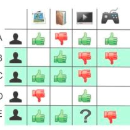Matrix factorization (MF) has been widely applied to collaborative filtering in recommendation systems. Its Bayesian variants can derive posterior distributions of user and item embeddings, and are more robust to sparse ratings. However, the Bayesian methods are restricted by their update rules for the posterior parameters due to the conjugacy of the priors and the likelihood. Variational autoencoders (VAE) can address this issue by capturing complex mappings between the posterior parameters and the data. However, current research on VAEs for collaborative filtering only considers the mappings based on the explicit data information while the implicit embedding information is overlooked. In this paper, we first derive evidence lower bounds (ELBO) for Bayesian MF models from two viewpoints: user-oriented and item-oriented. Based on the ELBOs, we propose a VAE-based Bayesian MF framework. It leverages not only the data but also the embedding information to approximate the user-item joint distribution. As suggested by the ELBOs, the approximation is iterative with cross feedback of user and item embeddings into each other's encoders. More specifically, user embeddings sampled at the previous iteration are fed to the item-side encoders to estimate the posterior parameters for the item embeddings at the current iteration, and vice versa. The estimation also attends to the cross-fed embeddings to further exploit useful information. The decoder then reconstructs the data via the matrix factorization over the currently re-sampled user and item embeddings.
翻译:在建议系统中合作过滤系统广泛应用了矩阵系数(MF) 。 但是, Bayesian 变量目前对 VAE 进行的合作过滤只考虑基于明确数据信息的绘图,而隐含的嵌入信息被忽略了。 但是,由于前置和可能性的共性,Bayesian 方法受到其后端参数更新规则的限制。 Vairational 自动查看器(VAE) 能够捕捉后端参数和数据之间的复杂映射来解决这个问题。 然而,目前关于 VAE 的合作过滤工具的研究只能考虑基于明确数据信息的映射,而隐含的嵌入信息则被忽略。在本文件中,我们首先从两个角度为Bayesian MFM 模型的更新规则下限(ELBO) 。 根据 ELBOs, 我们提议基于 VAE 的 Bayesian MFF 框架来解决这个问题。 它不仅利用数据, 而且将有用的信息嵌入到随后的用户项目联合分布。 正如 ELBOI, IM 和 正在将用户的当前浏览器 的嵌入到前端项 的用户和 嵌入项目。




